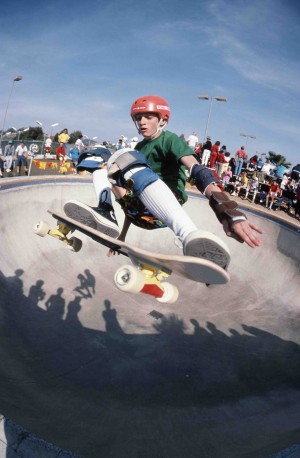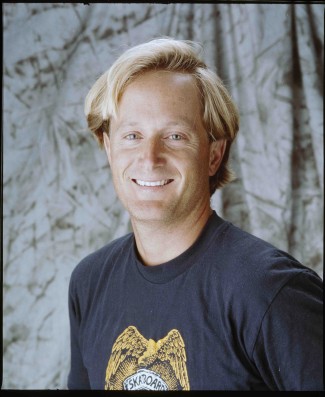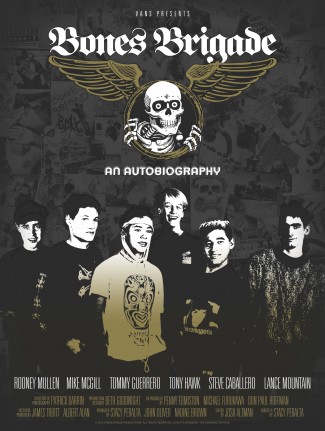PART II: Stacy Peralta on skateboarding, surfing, leaving Hollywood behind

The Bones Brigade, a skateboarding team run by Stacy Peralta in the 1980s, has certainly reached legendary status. The names associated with the professional squad have become second nature in the industry. The core group consisted of Tony Hawk, Rodney Mullen, Mike McGill, Tommy Guerrero, Steve Caballero and Lance Mountain — perhaps the greatest synergy of talent in skateboarding history. They were self-identified outcasts who enjoyed one another’s company, competition and unique lifestyle.
Now, audience members can relive the glory days when Peralta and his business partner George Powell changed the face of the industry forever. Bones Brigade: An Autobiography, the new documentary directed by Peralta, features a voluminous amount of archival footage and taped interviews, highlighting all of the triumphs and obstacles of the iconic skateboarders.
Recently, John Soltes of Hollywood Soapbox talked with Tony Hawk and Stacy Peralta about their skateboarding journeys.
Click here for our interview with Tony Hawk.
Click here for Part I of our interview with Stacy Peralta.
Below find Part II of our interview with Stacy Peralta. Questions and answers have been slightly edited.
Did you reconnect with Mr. Powell because of the film, or had that happened before the film?
It had happened way before the film. It happened about five years prior. What happened is Lance [Mountain] called me one day and he said, ‘Look, there’s a real need for our decks being reissued. There’s a lot of collectors that want to buy our reissues. And we would like to make a limited run of these, but we don’t want to do it unless you’re involved.’ And I had never planned on getting back involved, but I don’t know what it is about Lance, but when Lance called, I just said, ‘OK, I’ll do it.’ And it was Lance also that called me and finally got me on board to do the film. So, it just kind of all kept unfolding.
The release of the film is interesting through downloads, in theaters and the festival circuit. Are you instrumental in that?

When we came out of Sundance, we had three conventional independent distribution offers. And we decided to say no to all them. I’ve done that route before, and it’s never paid off for me, in regards to me benefitting off my films financially. I’ve never made a dime in the profit sharing. I’m supposed to, but I never see any money. So, that’s very frustrating. It’s very hard to sustain myself as a filmmaker.
So, I met a company that goes under the name of Topspin. They have had a tremendous amount of success in the music industry, helping bands do everything themselves. And they said, ‘We think you have the perfect film to launch how we run our business, and we would like to be in business with you.’ They presented to me what they do, and they presented to me a plan where I own the copyright of my film. They only take a percentage of sales, what typically an agent would take. And they basically corral all the fans that I have, Tony Hawk has and the Bones Brigade have, and they put them under one website, and offer them tickets to theaters to see the film, special products, downloads, Blu-rays, DVDs. (Click here for website)
And it’s working spectacularly. We have sold far ahead of our financial projections. It’s gone so well that I don’t think I’m going to go back and do it the other way again. It’s been a very empowering experience. … They’ve really guided us the whole way. They said, ‘Listen … this is going to be like a concert. They’re going to want more than T-shirts. They’re going to want personal items from you guys.’ They go, ‘Dig into your vaults, find things that you can sell, and sell them direct on this site. It’ll draw up tremendous amount of excitement.’ And it really has. What we expected to take six weeks to sell took one day.
There’s been so much demand for the products that we’ve had to increase what we’re offering to the point where we’re having vault sales every week with special items. I mean it’s really brought a tremendous amount of activity to the site, and also they set up for us a Bones Brigade Instagram site, and we now have 10,000 photographs posted from fans all over the world, of their own Bones Brigade memorabilia.
So, it’s been an absolute blast, and we’re also getting feedback from our customers saying, ‘Look, how do we have a screening in our town?’ We email them back saying, ‘Get in touch with the website. The website will show you how you can have your own screening in your own town.’ And these things are going on right now.
I’ve never done anything like this before, and I couldn’t have done this 10 years ago because the technology wasn’t in place, but it is now. And I think what they’ve done for us is pointing … me as an innovative filmmaker toward a sustainable future. … It allowed us to behave the way we used to behave. When I was making my skateboarding videos in the ‘80s, when I had my team in the ‘80s, we were extremely independent. We did everything in house ourselves. Over the past 10 years, I’ve been relying on Hollywood and the distribution system thereof to take care of my films, and now that I’ve done it this way, I’m back in the driver’s seat now. I’m directing how this is going, and … [it’s] empowering me to make me realize that I can do this, and that there is another alternative way to distribute a film and to reach our audience.

When you watch Bones Brigade as a movie, do you see it as an historical document, in terms of that success and synergy of talent was pretty unique to that time period and may never happen again?
It could happen again, but I doubt it will. And here’s why I say this. That group of skateboarders had the most blank canvas of any group before or since. They had the most blank canvas, and they finally had the terrain and the skateboard technology to really do what they wanted to do.
My generation didn’t have the technology, and we didn’t have the terrain to take it where we thought it could. But this generation could. And as a result of that confluence of things, they were able to get accomplished so much in that time period. I mean Rodney Mullen and Tony Hawk together have invented close to 200 tricks. I mean that’s astonishing. So, to me, if you look at them, I compare them almost to classical musicians for the output of like a Chopin. Please don’t get me wrong. I’m not saying they are … lofty like that, but as far as their output, they got a chance to really make a difference, and they really did make a difference.
And also because there’s so much money in the sport today, I don’t know if you could ever keep a group of six guys like that on the same team. I just don’t know if it would be possible.
Your career has these great traditions every few years. … The jump from the skateboarding world to more of the film world, was that a scary jump, a necessary jump?
While I was making my skateboarding videos, I started getting offers in Hollywood to direct small projects. And it’s always scary when you embark on something new. It’s always nervewracking and a lot of anxiety. But I had to make the change. It was time to do something different. Had I stayed in skateboarding, I would have continued kind of going in the same circle. I don’t feel like I would have learned much. And so branching off to become a filmmaker, it enabled me to develop new skills. It enabled me to learn how to fail in a whole new way. And I learned how to tell stories. It was challenging. It gave me something to get out of bed for.
Do you think you’ll ever touch skateboarding again as a subject for a documentary?
Well, I didn’t think I would do it again before I did this one. I’m not eager to do it, but having already once said that I’d never do it again, and then found myself doing it again, I don’t know what I’ll do now. I’m afraid to say, ‘I won’t.’
Are you still active in skateboarding or surfing yourself? Is it a daily thing for you?
As we’re conducting this interview, I’m looking at the surf right now out of a window. I surf all the time, and I try to skateboard about four times a week. And I do it for spiritual reasons — not religious, but spiritual. And what I mean by that is that it’s a part of who I am, and I’ve come to realize I have to have it integrated into my life, because skateboarding has so much to do with how I’ve informed and created my own identity. And so I just have to get on that board once a day and just go out and ride a little bit.
By John Soltes / Publisher / John@HollywoodSoapbox.com
-
Click here for more information on Bones Brigade.

